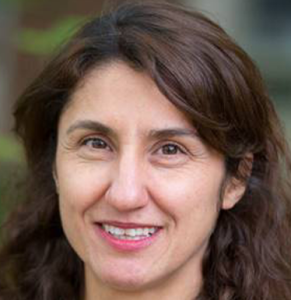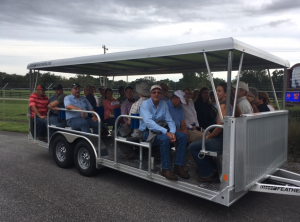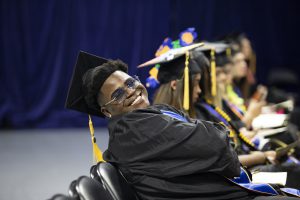Through a project called Florida AgrAbility, Serap Gorucu tries to ensure that everyone – even those with functional limitations — can operate the technology and machinery on the farm where they work.

“Agricultural producers must be able to work their farms,” said Gorucu, a UF/IFAS assistant professor of agricultural and biological engineering. “With the AgrAbility project, we aim to enhance the quality of life for farmers, ranchers and other agricultural workers with disabilities.”
Gorucu’s clients are grateful for her tireless efforts.
“Florida AgrAbility is very important to farmers, and not just so we can continue what we’re doing and have the support to keep going with our careers,” said Mika Hardison, a beekeeper in Jacksonville. “But we want to be independent, and we want to keep doing the things that we love doing. I am looking forward to just having the physical support and the modifications I need in order to keep doing what I love.”
Gorucu is just one of many examples of how faculty and staff at UF/IFAS improve access for people with limitations — and make science-based information available to everyone.
July 26 marks the 33rd anniversary of the Americans with Disabilities Act. So, it seems fitting to highlight some of the many ways UF/IFAS works with its stakeholders to help make research, teaching and Extension as accessible as possible.
UF/IFAS leverages a full gamut of ideas and technologies to make it happen:
- Translating and trans-creating Extension documents and news releases into Spanish, allowing them to be widely shared and culturally relevant.
- Trams that allow disabled visitors and growers to participate in field days and tour UF/IFAS research fields and groves.
- Closed-captioned videos and live-captioned online presentations for those who struggle with hearing.
- Document accessibility services. These services offer various solutions to ensure compliance with accessibility standards and empower individuals with disabilities to access and interact with UF/IFAS content.
Extension successes
These actions focus on ensuring everyone can access as much information as possible, said Saqib Mukhtar, associate dean of UF/IFAS Extension.
“We are UF/IFAS Extension education for All,” Mukhtar said. “This signifies that our faculty and staff make every effort to ensure that science-based learning experiences are accessible to everyone. That includes document translations, subtitles for the hearing impaired, ADA-compliant accessibility in our Extension offices and more.”
Anita Neal, director of the UF/IFAS Southeast Extension District, cited many ways UF/IFAS is helping make activities and information more available.
“Most UF/IFAS Extension offices are housed in county buildings. As a rule, counties comply with ADA requirements for accessible parking, ramps for accessibility, restroom accessibility, elevators, and doors that can be opened easily and, in some cases, with the assistance of an automatic button,” Neal said.
Neal also mentioned this UF/IFAS Extension document. It offers tips to Extension professionals and others to help them stage events or programs for clients of all abilities – from the start of the planning process rather than as an afterthought.
Because UF/IFAS is dedicated to serving all Florida residents, it provides short video scenarios to review with volunteers, whether they’re with Florida 4-H, Master Gardener Volunteers, or others.
Sharing research with all
Jerry Fankhauser, associate director of the Florida Agricultural Experiment Station, brought an idea from his previous employer (Purdue) to UF/IFAS – a tram for folks who otherwise can’t walk UF/IFAS research fields and groves.
The trams features a wheelchair ramp that allows people with varied ability levels onto the vehicle, which lets them ride along with everyone else, Fankhauser said. UF/IFAS has two such vehicles — one at the Plant Science Research and Education Unit in Citra; the other at the Tropical Research and Education Center in Homestead.

“With our trams, people who are otherwise unable to walk can see our research fields and groves. That means they can observe the work of our scientists, who are trying to grow crops that withstand pests, diseases, and other climate-related issues,” said Fankhauser. “Everyone gets a front-row seat to the best of UF/IFAS research.”
UF/IFAS research and education centers and demonstration sites across Florida exceed ADA requirements.
“When a new structure is built, everything is designed to be ADA compliant including parking spaces, egress pathways, bathrooms, and building fixtures,” said Ronnie Cooper, associate director of facilities for UF/IFAS. “During a significant renovation, efforts are made to bring non-compliant spaces up to date.”
The primary goal during a renovation is to gain ADA accommodation for as many points of use as possible, Cooper said.
Three notable upgrades since passage of the ADA in 1990 would be bathrooms, egress pathways and countertop workspaces.
“We have to make sure staff, faculty and visitors to our sites have a smooth path from an accessible parking space, throughout most of the buildings, and especially to each restroom,” Cooper said.
Teaching and learning
Online courses meet accessibility standards, including but not limited to use of headings and subheadings, alternative image text and color contrast, said Allen Wysocki, associate dean of the UF/IFAS College of Agricultural and Life Sciences (CALS).
CALS teaching faculty also invest in professional development opportunities, such as the Roche Teaching Scholars, CALS Spring Teaching Retreat and CALS Teaching Enhancement Symposium. At those seminars, faculty share ideas and learn from each other — and sometimes students – about how to better connect with students and serve their specific needs.

“Our teaching faculty are deeply committed to providing the best possible instruction for our students,” Wysocki said. “This includes helping make classroom instruction more accessible, whether courses are taught in person or online. Our faculty are always advancing their own knowledge and skills to keep up with current technology and ensuring our student experience comes first.”
For some context, here are some statistics about disabilities from the CDC’s Disability and Health Data System:
- About 5 million adults in Florida live with a disability. That represents 26% or 1 in 4 adults of Florida’s adult population.
- The most-reported disability types are mobility (12%), cognition (12%), independent living (6%), hearing (6%), vision (6%) and self-care (3%).
###
ABOUT UF/IFAS
The mission of the University of Florida Institute of Food and Agricultural Sciences (UF/IFAS) is to develop knowledge relevant to agricultural, human and natural resources and to make that knowledge available to sustain and enhance the quality of human life. With more than a dozen research facilities, 67 county Extension offices, and award-winning students and faculty in the UF College of Agricultural and Life Sciences, UF/IFAS brings science-based solutions to the state’s agricultural and natural resources industries, and all Florida residents.
 7
7
